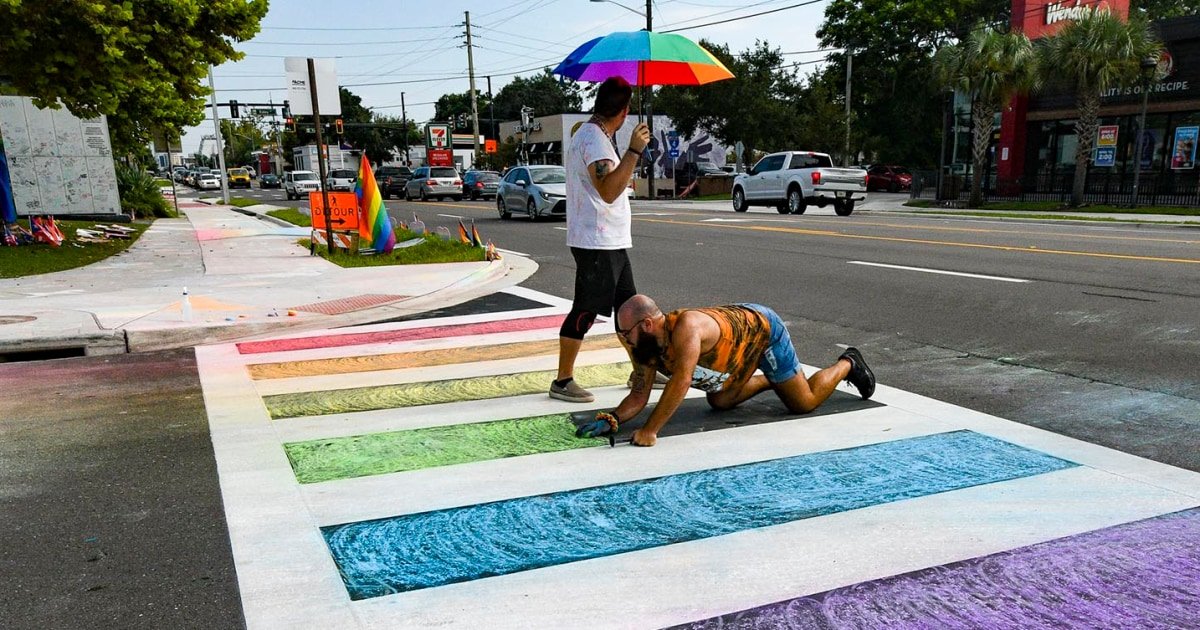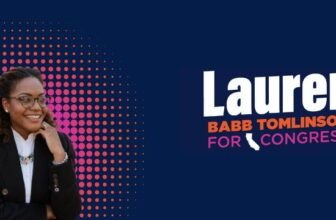The battle over LGBTQ inclusion in Florida has expanded outside of the state’s classrooms to its crosswalks.
Last month, the Florida Department of Transportation began removing rainbow crosswalks, Black history road murals and other street art after it updated its guidelines earlier this year to prohibit “non-uniform traffic control devices, such as pavement markings on state and local roads.”
A rainbow crosswalk created in Orlando as part of a memorial for the 49 people fatally shot at the Pulse LGBTQ nightclub in 2016 was among the first that the Transportation Department painted over last month.
The next day, protesters gathered at the crosswalk to “re-paint” it with multicolored sidewalk chalk, and they continued to turn up to re-chalk the crosswalk after rain washed it away almost every day. Transportation officials repainted the crosswalk again last week, and Orlando police are now patrolling it 24/7.
Last weekend, four people were arrested for defacing a traffic device with chalk, though none have faced formal charges yet, so it’s unclear what kind of penalties they could face, according to Blake Simons, an Orlando-based lawyer who is representing them. A judge released all of them on their own recognizance, he said.
But the battle has spread beyond Orlando. City officials in Key West and Miami Beach planned to meet Wednesday to discuss resolutions regarding their cities’ rainbow crosswalks, which the state has ordered them to cover by this week. In St. Petersburg, transportation officials painted over a “Black History Matters” street mural that covered a stretch of road in front of the Woodson African American Museum of Florida. Two pastors were arrested Friday night for trying to stop officials from painting over the mural.
On Monday, St. Petersburg residents gathered at the city’s one remaining rainbow street mural. Tamara Leigh, 40, the founder of local group Tampa Bay Black Lesbians, said that about 100 people gathered at the event to create art and write messages of hope and love with chalk donated from across the country. She said that what struck her the most after the Black history mural was removed was how gray the street suddenly was.
“This is what happens when you remove diversity,” she said. “This is what happens when you don’t encourage inclusion. This is what happens when you shut people out. What’s left over is gray, and that was incredibly impactful for me. It’s just a visual representation of the things that are happening in this state, in this country.”
New state and federal guidance on ‘political messages’
Florida’s Transportation Department has said it is “ensuring roadways are not utilized for social, political, or ideological interests” and that the state is prepared to withhold funds from local governments that don’t comply with the directive to cover rainbow crosswalks and street murals.
Many cities were given deadlines in early September, though some, including Delray Beach, were extended after the city requested a hearing with the Transportation Department. Delray Beach officials have until Friday to submit supporting documents contesting the removal of a rainbow street mural, according to WPTV, an NBC affiliate based in West Palm Beach.
The guidance applies to a variety of street art, including a “Back the Blue” mural on the street outside the Tampa Police Department’s headquarters and a crosswalk in front of the Daytona International Speedway that looks like a checkered raceway finish line, The Associated Press reported.
Florida’s Transportation Department said it informed local governments of its policy change in June, and then, in July, U.S. Transportation Secretary Sean Duffy directed the country’s governors to “identify needed safety improvements” within 60 days.
“Roads are for safety, not political messages or artwork,” Duffy said in a statement at the time.
Florida Gov. Ron DeSantis has maintained a similar refrain.
“You don’t have a First Amendment right to commandeer someone else’s property,” DeSantis said Tuesday, when asked about protesters who were arrested in Orlando for chalking the rainbow crosswalk in front of Pulse. “You do not have a right to take somebody else’s property for your messaging purposes.”
‘Refuse to be erased’
Some Floridians who disagree with the Transportation Department’s new policy say its reasoning isn’t supported by data. For example, an April 2022 study commissioned by Bloomberg Philanthropies using historical crash analysis found that roadways with asphalt art projects saw a 50% decrease in the rate of crashes involving pedestrians or other vulnerable road users, a 37% decrease in the rate of crashes leading to injuries and a 17% decrease in the total crash rate. The study also found a 25% decrease in pedestrian crossings involving a conflict with drivers, a 27% increase in frequency of drivers immediately yielding to pedestrians and a 38% decrease in pedestrians crossing against the walk signal.
An investigation by WPTV found that there have been only two crashes at the intersection where Delray Beach’s Pride mural is located since the crosswalk was painted four years ago. In contrast, there were 15 incidents at the same location in the four years beforehand.
Brandon Wolf, a survivor of the Pulse nightclub shooting and the national press secretary for the Human Rights Campaign, the country’s largest LGBTQ advocacy organization, said Wednesday that the state has repeatedly changed its justification for removing the street art. He pointed to data showing that vibrant crosswalks improve pedestrian safety. He also noted that in 2023 DeSantis named a road in Florida after conservative talk show host Rush Limbaugh.
“It doesn’t work to say you’re erasing political statements from the pavement, and so now you’ve gone to, ‘Well, we just want every crosswalk to be standard,’” Wolf said. “The incoherence of their own strategy tells you that they’re not sure why they’re doing this, except to visibly demonstrate that they have control and power. That is what this is about. It is about a physical demonstration of force, of power over people — a reminder that they are the people in control, and at any given moment, they can decide to erase something.”
Blake Simons, the attorney representing the four people who were arrested at the Pulse crosswalk over the weekend for using chalk on it, said that he is personally not upset about the Transportation Department’s policy. Rather, he said protesters have a right to exercise their free speech.
“As long as people are not actually damaging things, we still have the right to exercise our free speech, even through conductive actions, as long as we’re not defacing property,” Simons said, adding, “This argument that this chalk is defacing it is just ludicrous.”
Wolf said DeSantis and the Trump administration have “desecrated” the Pulse nightclub memorial, where the state approved the rainbow crosswalk in 2017. When he’s there, he said, he feels closest to his friends Juan Guerrero and Drew Leinonen, who were killed in the shooting.
He added that the protests are “a testament to the power of the people to refuse to be erased.”
“If DeSantis and Trump thought that they could silence or erase a community with one crosswalk or with one bucket of paint, they were sorely mistaken,” Wolf said.









